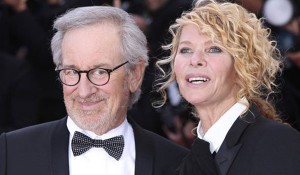Cannes film fest race wide open in final hours
CANNES — A jury headed by Steven Spielberg kept everyone guessing which film would take the Palme d’Or at the close Sunday of the Cannes Film Festival, with an epic lesbian love story, a Coen Brothers dark comedy and a blood-spattered critique of Chinese society the leading contenders.
Spielberg’s panel, packed with fellow Oscar winners Nicole Kidman, Ang Lee and Christoph Waltz among other luminaries, was deliberating in a secluded villa in the hills above the French Riviera resort.
Twenty films featured in competition at the world’s top cinema showcase, and reviewers said at least a quarter of them looked like possible winners of the coveted Golden Palm.
“It’s a testament to the strength of this year’s competition slate… that no single runaway favorite seems to have declared itself,” wrote film industry bible Variety.
Critics swooned over French-Tunisian director Abdellatif Kechiche’s coming-of-age tale “Blue is the Warmest Colour” about a 15-year-old girl’s first love, an older woman.
Article continues after this advertisementAt three hours in length, the picture traces lead character Adele’s (Adele Exarchopolous) infatuation with a beautiful blue-haired art student played by rising star Lea Seydoux, while also exploring themes such as class in France and women’s careers.
Article continues after this advertisement“Sure to raise eyebrows with its show-stopping scenes of non-simulated female copulation, the film is actually much more than that: it’s a passionate, poignantly handled love story,” a Hollywood Reporter critic said.
“Remarkably, though, the explicit scenes never really feel pornographic, especially since the film isn’t about titillation or arousal.”
It topped critics’ polls in trade journals Screen International and Film Francais as well as London bookmakers’ rankings.
But reviewers wondered whether the jury would shy away from rewarding its lengthy depictions of on-screen lovemaking — among the most explicit in Cannes competition history.
Joel and Ethan Coen’s “Inside Llewyn Davis” starring Carey Mulligan, Justin Timberlake and newcomer Oscar Isaac in the title role delighted audiences with a mix of soulful 1960s folk singing and absurdist humor.
The Coens’ film “Barton Fink” won Cannes in 1991 and the brothers last entered the competition in 2007 with “No Country for Old Men.”
China’s Jia Zhangke with “A Touch of Sin” offered a shocking look at rampant corruption and exploitation of downtrodden citizens, who can only respond with violent rage.
US website Salon called it “an art-house film with the body count of a ‘Die Hard’ sequel” while London’s Daily Telegraph said it depicted China as “cold and almost unnavigably vast; a place where sin may be the only thing we have to keep us warm.”
Iranian Oscar winner Asghar Farhadi made a strong showing early in the festival with “The Past” an intricately structured drama about a patchwork family set in France.
Other plausible contenders included US director Alexander Payne’s recession-era road movie “Nebraska”, lush Roman society portrait “The Great Beauty” by Paolo Sorrentino, and an emotional Japanese family drama about young boys switched at birth, Hirokazu Koreeda’s “Like Father, Like Son.”
In a year in which gay themes resonated on and off screen, Steven Soderbergh’s made-for-TV biopic of celebrity pianist Liberace and his long-time lover, “Behind the Candelabra,” drew praise for its A-list stars Michael Douglas and Matt Damon.
A win for that picture or “Blue” would come on the day of a major demonstration in Paris against a new law making France the 14th country to legalise same-sex marriage.
Few films left audiences entirely cold, and the biggest disappointments met with loud booing and mass walkouts.
Critics savaged one of the most highly anticipated entries, Danish filmmaker Nicolas Winding Refn’s latest pairing with Canadian star Ryan Gosling after “Drive” captured the best director prize two years ago.
“Only God Forgives” set among the fight clubs of today’s Bangkok brought an onslaught of torture and gore, and reviewers hissed their disapproval as the credits rolled.
In the run-up to the main awards, a documentary by Cambodian-French director Rithy Panh about relatives wiped out in the Khmer Rouge’s tyrannical grip on Cambodia in the 1970s picked up the top prize Saturday in the “Un Certain Regard” category, which showcases films by emerging directors.
French drama “Amour” about an ageing Parisian couple took the Palme d’Or last year.
The awards ceremony for the 66th Cannes festival was to start at 1700 GMT, followed by a screening of “Zulu,” a detective drama set in South Africa, with Orlando Bloom and Forest Whitaker under the direction of France’s Jerome Salle.
